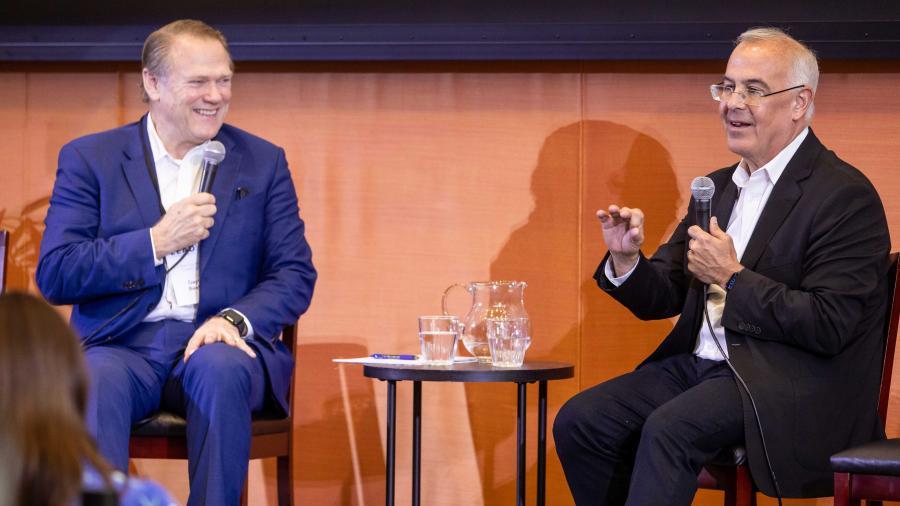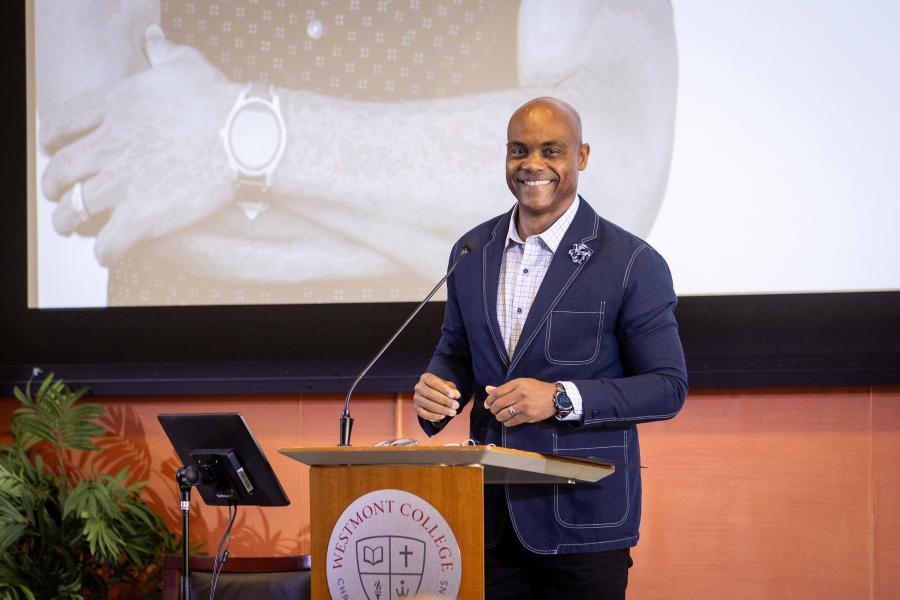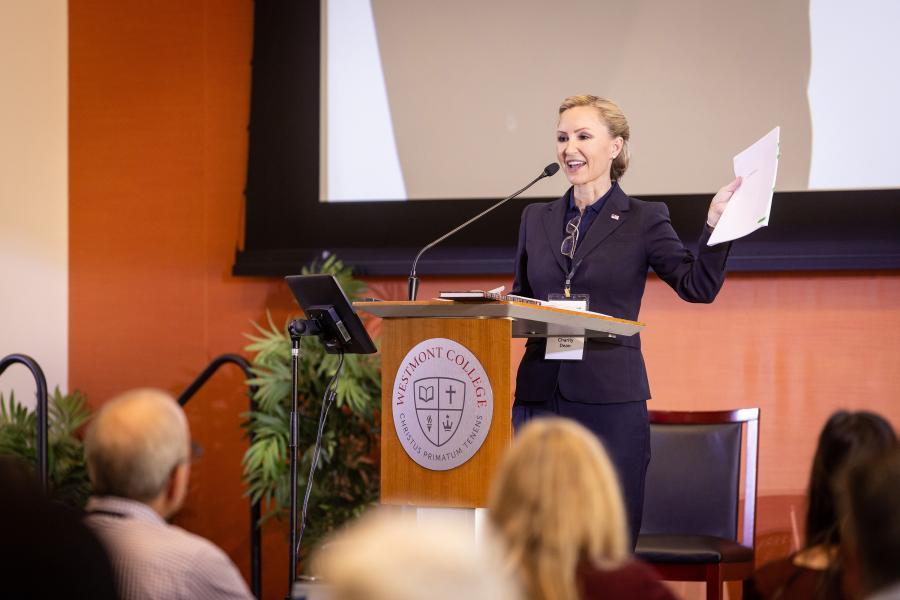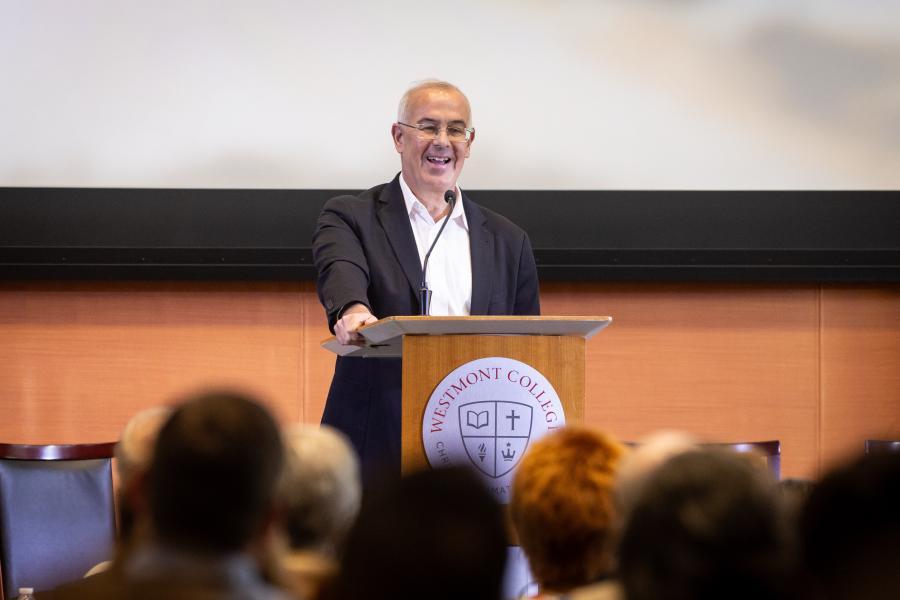Westmont News
Storytellers Shine at LEAD Conference

By
Scott Craig
Westmont’s Lead Where You Stand Conference delivered inspirational stories, helpful advice and insightful conversation for the 173 attendees with the goal of “Pursuing the Greater Good in Challenging Times” June 5-6 at the Montecito college. It featured keynote speakers Marcus ‘Goodie’ Goodloe, Dr. Charity Dean, Matthew Luhn, Gayle D. Beebe, David Brooks, Jeff Schloss and Kim Denu.
“Storytelling has the power to transform leadership by building trust, driving meaningful change and altering the DNA of an organization,” said Reed Sheard, vice president for college advancement and chief information officer advancement and IT, who kicked of the conference, which is sponsored by the Montecito Institute for Executive Leadership. “Through storytelling, leaders can shape the understanding and trajectory of their organization, creating a lasting impact on its success.”

Goodloe, author, mentor and Westmont trustee, examined Martin Luther King Jr.’s “I Have a Dream” speech and extracted the lessons of that day in 1963 in Washington, D.C. “At its core, leadership is the ability to move people from here to there,” Goodloe said. “Leadership advances people beyond their physical, emotional and spiritual capacities in order to create something beautiful.”
MLK stuck with “I have a Dream,” though his followers had heard versions of it before and some considered it trite or cliché. Goodloe quoted Stephen Covey, the late author of “The 7 Habits of Highly Effective People,” who said: “Repetition is the mother of learning and the father of action, which makes it the architect of accomplishment.”
“By repeating key points, you increase the chances of your audience retaining the information and acting upon it,” Goodloe says. “People are naturally reticent to change. We often need to be exposed to a new idea or concept multiple times before we are willing to accept it.”
The success of MLK’s speech was also dependent on those he had invited to join the cause, including the Coalition of Conscience, more than 800 human rights organizations committed to speak and act on behalf of African American suffering and justice. “Your idea should require the assistance of others wherever you’re trying to advance,” Goodloe says. “It should demand you having others to be a part of your cause. If you can achieve your dream on your own, you’re dreaming too small.”
He also stressed the importance of a strategic vision and long-term planning, saying King’s greatness was the strategy that was on full display after his speech, including a telegram to Harry Belafonte a month prior.
Goodloe concluded with the advice of saving the best for last, since King spoke last that day. “But make sure whatever is indeed last is worth the wait,” he says. “On the day of the march, King’s words and power and potency of that moment are what people remember about that day, and what a day, and what a finish.”

Dean, Santa Barbara County’s former public health director and current CEO and cofounder of the Public Health Company, shared how she uses her medical knowledge and spiritual practices to uncover hidden insights and solve complex problems in epidemiology and public health. “As we mature in our field of expertise and in our spiritual fitness — our pursuit of God’s one true calling for our lives — those two become an intertwined duality that cannot be separated from one another — and the answers come from there,” said Dean, one of the central characters in Michael Lewis’ book, “The Premonition: A Pandemic Story.”
She emphasized the need for a comprehensive approach combining medical development, public health and artificial intelligence to address emerging biological threats. “The kind of damage that COVID caused, and as devastating as it was, will be minor compared to the potential of the kinds of biological threats that are out there today,” she said. “Because of advances in biotechnology and machine intelligence, components can be artificially rearranged and modified into something novel that can't be detected, that won't be recognized, and that we don't have the tools for.”

Brooks, New York Times columnist and weekly guest on PBS NewsHour, began the second day of the conference examining the key traits of our life. “It’s not the intelligence you gain at school, it’s the hunger for wisdom, the ability to keep learning up until the moment you die,” he said. “When you apply for jobs, the really good workplaces will be less interested in what you do now, rather what you can learn tomorrow. And if you get to such places like Westmont, you’ll discover the most valuable thing you learn is not what was in your major, but the ability to learn how to learn.”
He challenged the traditional definition of ability and success, which prioritizes standardized tests and academic achievements, and argued that essential qualities like character, creativity, and emotional intelligence are often overlooked.
“We need a different definition of merit,” Brooks said. “We need to see ourselves and see each other, not by how we did on a standardized test at 18? But do we have the hunger to keep on growing through life?”

Luhn, an animator, writer and story consultant formerly at Pixar and The Simpsons, shared his personal journey of discovering his passion, emphasizing the importance of family, creativity, and inspiring others to pursue their passions.
He suggested applying storytelling principles, such as using a beginning, middle, and end structure like a hero's journey, when sharing information or inspiring new ideas.
“Whether you're selling something or you're inspiring a new way of thinking, you want to think like a storyteller,” he said. “You know a story is working when it genuinely makes you feel something. It's not the facts and figures or the data and the statistics people are going to remember. In the end whoever told the best story is the one who wins.”
The conference returns to Westmont June 4-5, 2025.